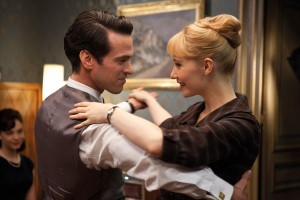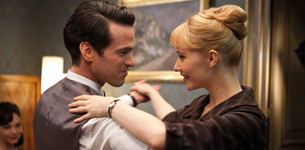By Kirsten Mahon/nw/multimedia editor

A foreign comedy film that appeals to an American audience is rare. It’s more rare when the subject might be the most boring to film.
But considering setbacks, the French did it well with Populairé.
The story outlines the changing lives of working citizens in the 1950s and early ’60s. A plot that involves an endearing sense of family and themes of hard work with large payoffs is what keeps the viewer interested in the life of a young woman competing in typewriting championships. The best-selling children’s movies are about competition, heroes and admirable winners.
Populairé encompasses that sense of young, with wonderful wit perfectly delivered.
But the themes can only go as deep as the shattering desire to win something that’s been worked for or to love someone — the two most overplayed themes in theaters. For that, naturally, the movie leaves a lot to be desired in overall content.
For what it is, it does its job — to entertain and to make the audience smile. Happy endings with cheesy undertones make fun movies.
The most commendable asset to the movie is the seamless acting, but this isn’t saying much because the script doesn’t offer challenging roles. Of its kind, this movie is one of the best, but this kind of movie doesn’t satisfy the crowd anymore. It is the perfect moneymaker for the time period it encompasses, the late 1950s. Decades later, it begs the question of what the movie is doing here among other recent period-piece movies that consistently toe the moral line between good and bad, like Gangster Squad and The Great Gatsby. Movies that are thrilling or enthralling almost always have that line.
Populairé is a pretty picture with perfect edges and no frayed or unfinished business. Movies that innocent are barely watchable now, even for pre-teens, which is possibly the audience Populairé wanted.
After watching, regardless of its easiness and shruggable concepts, there are tiny moments not so easily forgotten. French girls chattering in unison about the popularity of the main character, Rose Pamphyle, is a funny moment, where the viewer is reminded of a cheesy Disney background. Louis Échard, the love interest of Rose, tries to make a point to Rose and a secondary character by playing five-finger-fillet so fast the children start to watch and ends up stabbing himself in the hand. The scene quickly switches to Rose bandaging his hand, lightly scoffing and mocking Louis for being stubborn. Bursts of slapstick or witty humor make the audience smile and give the film a redeeming quality.
Final take: A film needs more than good acting and few witty lines to impress a modern audience.
Those who would enjoy it: Young girls who want to go to France and couples who are too in love with each other to really notice how much a movie is lacking.



























